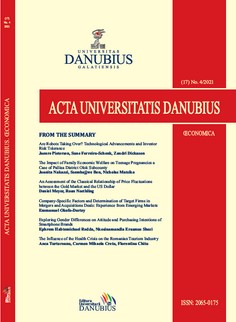Are Robots Taking Over? Technological Advancements and Investor Risk Tolerance
Are Robots Taking Over? Technological Advancements and Investor Risk Tolerance
Author(s): Jaenre Pietersen, Sune Ferreira-Schenk, Zandri Dickason-KoekemoerSubject(s): Business Economy / Management, ICT Information and Communications Technologies
Published by: Editura Universitară Danubius
Keywords: Robo-advisors; risk tolerance; investors; technology;
Summary/Abstract: The banking industry is being overhauled by robots. Artificial intelligence (AI) is the most recent technological breakthrough made in the banking industry. There is a wide range of variables that influence investor risk tolerance which has previously been examined, however, the influence of technological advancements on investor risk tolerance in a South African context remains unsolved. This paper aims to investigate the influence of technological advancements on investor risk tolerance. The results of this study found technological factors contributed significantly towards explaining high-risk tolerance behaviour to a rather moderate degree. Evidence suggests investors employing Robo-advisors for assistance when making investment decisions, tend to become more risk-tolerant. The results of this study procured that certain demographic variables included in this study have a significant influence on the individual investor risk tolerance levels of South African investors. It is recommended that the research study be utilised by individual investors, financial planners, investment companies and current or future researchers originating from both frontiers to be acquainted with how technological advancements influence investor risk tolerance. Therefore, ensuring technological advancements are used accordingly, to the benefit of the investor privately or in practice.
Journal: Acta Universitatis Danubius. Œconomica
- Issue Year: 17/2021
- Issue No: 4
- Page Range: 7-27
- Page Count: 21
- Language: English

